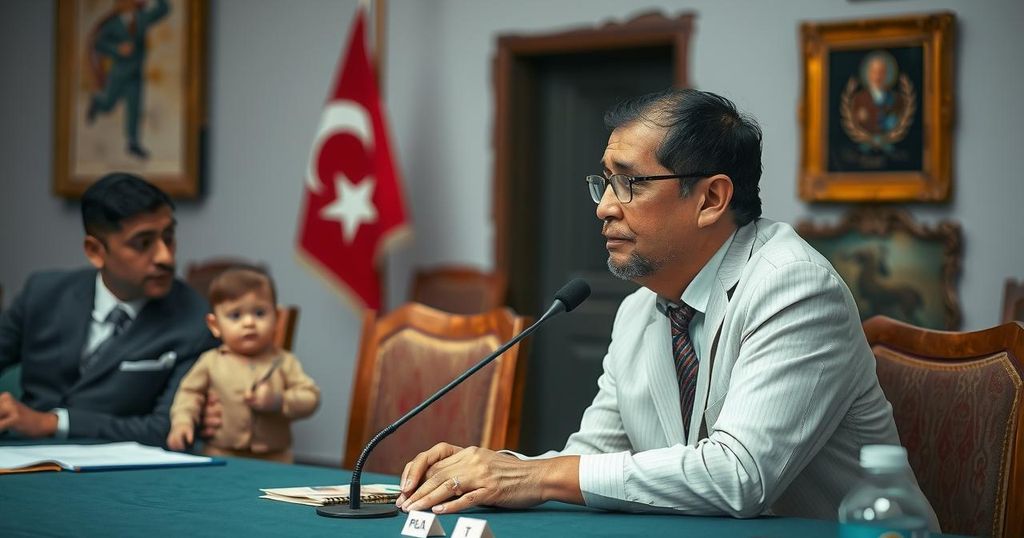Cuban Ambassador to Argentina, Pedro Pablo Prada, emphasized the need for adherence to international law and respect for sovereignty in a recent meeting. He condemned the U.S. blockade and its impacts, expressed solidarity with Palestine, and endorsed Latin American unity. Prada highlighted Cuba’s resilience and commitment to social justice while celebrating its inclusion in BRICS as a positive step for development.
In a recent meeting with diplomats, parliamentarians, and members of the Solidarity Movement in Argentina, Cuban Ambassador to Argentina, Pedro Pablo Prada, emphasized the necessity of adherence to the United Nations Charter and international law principles, particularly regarding the sovereignty and self-determination of nations. Amidst challenging circumstances, he reaffirmed Cuba’s commitment to reinforcing its socialist democracy and ensuring the rights of its citizens while combating hegemonic ideologies and cultural imperialism.
Ambassador Prada condemned the enduring economic, commercial, and financial blockade imposed by the United States over the past six decades, highlighting the detrimental impacts of Cuba’s designation as a state sponsor of terrorism. He pointed to a media campaign against Cuba’s socialist process, which began on January 1, 1959, as another challenge the nation faces. He also called for an end to violence against Palestine and criticized NATO’s expansionism.
Stressing the importance of regional unity, he stated, “We defend Latin American and Caribbean unity in its great diversity, without exclusions or fratricidal aggression,” underscoring Argentina’s right to sovereignty over the Malvinas, South Georgia, South Sandwich Islands, and adjacent maritime territories. The ambassador expressed confidence in the enduring friendship between Cuba and Argentina, describing it as “fireproof.”
Prada reaffirmed the commitment to preserve the freedoms that Cubans fought for over 66 years ago, framing them as invaluable. He attributed Cuba’s current difficulties largely to the intensified silent war waged by the United States, noting that the SSOT listing exacerbates the challenges posed by the blockade and global crises, including the COVID-19 pandemic.
He highlighted the resilience of the Cuban people, mentioning that over 700,000 Cubans recently marched in Havana in solidarity, countering the biased portrayal of Cuba in international media. “Socialist Cuba resists and does so thanks to the heroic sacrifice, unity and dignity of its people, as well as due to international solidarity. We will never be alone,” he declared. The ambassador affirmed Cuba’s plans for development and social justice, celebrating its inclusion in BRICS as a promising opportunity for progress.
The importance of solidarity and peace was a central theme in the comments made by Ambassador Prada during his address. The historical context of Cuba’s relations with the United States, marked by a longstanding embargo and political isolation, informs the contemporary challenges the country faces. Since the revolution in 1959, Cuba has pursued a socialist model and navigated various international pressures, reflecting a trajectory of resilience against external adversities. The ambassador’s remarks also underscore the broader discourse on Latin American unity and sovereignty, which has been a significant aspect of regional politics since the Cold War era. In this context, issues such as the Malvinas dispute and NATO’s expansion are tied to both national identity and regional stability.
Ambassador Pedro Pablo Prada’s statements underscore Cuba’s commitment to preserving its sovereignty and socialist principles amidst ongoing challenges posed by U.S. policies and international pressures. His emphasis on the unity of Latin America and the Caribbean reflects a broader regional ambition to resist hegemonic influences, promote self-determination, and foster solidarity. The call for an end to the blockade and unjust labeling is a critical aspect of Cuba’s diplomatic engagement, as it seeks to build upon its achievements and advocate for regional rights and protections.
Original Source: www.plenglish.com






